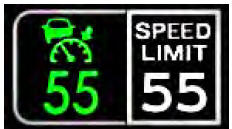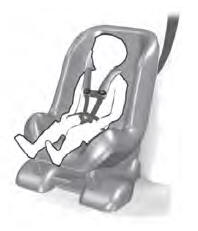Lincoln Aviator 2020-2026 Owners Manual / Adaptive Cruise Control / Adaptive Cruise Control Indicators - Vehicles With: Intelligent Adaptive
Cruise Control
Lincoln Aviator: Adaptive Cruise Control / Adaptive Cruise Control Indicators - Vehicles With: Intelligent Adaptive Cruise Control

A bracket appears around the set speed and the detected speed limit sign in the information display.
System Warnings
If the set speed is increased beyond the speed limit or speed limit plus a positive tolerance value, the set speed indicator flashes.
The warning does not occur if:
- You override the set speed using the accelerator pedal.
- The vehicle speed exceeds the set speed due to being on a downhill slope.
 Adaptive Cruise Control Indicators - Vehicles With: Adaptive Cruise Control
With Stop and Go
Adaptive Cruise Control Indicators - Vehicles With: Adaptive Cruise Control
With Stop and Go
Illuminates when you switch
adaptive cruise control on. The
color of the indicator changes to
indicate the system status.
White indicates the system is on but inactive...
 Switching From Adaptive Cruise Control to Cruise Control
Switching From Adaptive Cruise Control to Cruise Control
WARNING: Normal cruise control will
not brake when your vehicle is
approaching slower vehicles. Always be
aware of which mode you have selected
and apply the brakes when necessary...
Other information:
Lincoln Aviator 2020-2026 Service Manual: Description and Operation - Roof Opening Panel - System Operation and Component Description
System Operation Roof Opening Panel Operating System The accessory delay relay in the BCM supplies voltage through fuse F2 (10A) to the roof opening panel sliding glass motor and roof opening panel shield motor allowing the motors to respond to roof opening panel control switch commands...
Lincoln Aviator 2020-2026 Service Manual: Removal and Installation - Light Emitting Diode (LED) Control Module
Removal NOTE: The high series headlamp assembly comes with two light emitting diode (LED) control modules. The low series with one light emitting diode (LED) control module. NOTE: Removal steps in this procedure may contain installation details...
Categories
- Manuals Home
- Lincoln Aviator Owners Manual
- Lincoln Aviator Service Manual
- Remove and Reinstall the Battery
- Body and Paint
- Keyless Entry
- New on site
- Most important about car
Child Seats

Use a child restraint (sometimes called an infant carrier, convertible seat, or toddler seat) for infants, toddlers and children weighing 40 lb (18 kg) or less (generally four-years-old or younger).
Using Lap and Shoulder Belts
WARNING: Do not place a rearward facing child restraint in front of an active airbag. Failure to follow this instruction could result in personal injury or death.
Copyright © 2026 www.liaviator2.com
